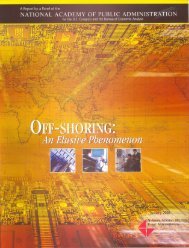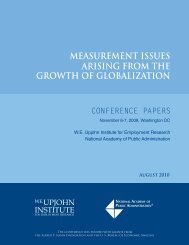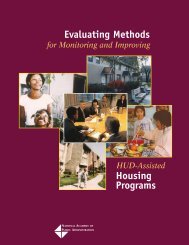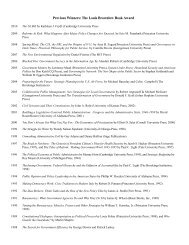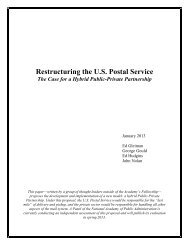High-Performance Partnerships - National Academy of Public ...
High-Performance Partnerships - National Academy of Public ...
High-Performance Partnerships - National Academy of Public ...
Create successful ePaper yourself
Turn your PDF publications into a flip-book with our unique Google optimized e-Paper software.
A 1996 survey <strong>of</strong> La Alma/Lincoln Park identified<br />
the Latino/Hispanic community’s gaps<br />
and services needs. It illustrated the need for<br />
mental health and domestic violence services.<br />
This is PATCH’s initial focus, but the holistic<br />
approach to community healing also includes a<br />
resident/youth leadership program, low-income<br />
health insurance, mentorship, bilingual education,<br />
Head Start, employment training, food<br />
bank, homeownership, and art and culture.<br />
Results<br />
In 2001, the PODER Project completed its<br />
three-year demonstration phase, during which<br />
it identified five goals to address its priority<br />
initiatives. The goals are:<br />
1. Maximize the capacity and impact <strong>of</strong><br />
neighborhood resources (community<br />
empowerment).<br />
2. Develop an effective neighborhood-based<br />
human services delivery system (the<br />
PATCH process).<br />
3. Reform existing investment streams.<br />
4. Improve housing, physical, and social infrastructure.<br />
5. Strengthen the capacity and effectiveness <strong>of</strong><br />
neighborhood governance collaboration.<br />
These goals emphasize outcomes that would<br />
directly benefit La Alma/Lincoln Park residents.<br />
They are designed to improve relationships<br />
between the residents and service delivery<br />
organizations, thereby increasing the<br />
capacity to accomplish more.<br />
Different methods are used to measure<br />
progress toward achieving these goals.<br />
Improved community empowerment and governance<br />
capacity are measured by the number<br />
<strong>of</strong> completed activities, while human services<br />
delivery and infrastructure improvement are<br />
assessed using more quantifiable outputs. The<br />
PODER Project has established specific targets,<br />
such as the number <strong>of</strong> first time home purchases,<br />
individuals receiving home ownership<br />
counseling, new businesses and jobs, and family<br />
case management services. In addition,<br />
investment streams are measured by dollars<br />
provided for project services and capital<br />
investments.<br />
Services delivered through the PATCH case<br />
management process in 2001 include:<br />
• 259 participants enrolled<br />
• Services provided<br />
• Domestic Violence – 53 recipients<br />
• Mental Health – 27 recipients<br />
• Substance Abuse – 76 recipients<br />
• 259 referrals from various sources, including<br />
PATCH Collaborative Probation, the<br />
Denver Health Department, Denver<br />
Department <strong>of</strong> Human Services, friends<br />
and relatives, and self-referral<br />
Challenges<br />
The PODER Project has encountered three<br />
main challenges. These are identifying and<br />
attracting partners capable <strong>of</strong> providing needed<br />
services, turf politics, and “agency centered”—<br />
rather than “client centered”—service delivery.<br />
To provide families with comprehensive services,<br />
the PODER/PATCH initiative continually<br />
searches for new programs to match the<br />
growth in community needs. The goal is to<br />
attract new partners to cover this spectrum<br />
while not duplicating other members’ efforts<br />
or programs.<br />
The partnership is intended to empower its<br />
members and the community. Yet the cultural<br />
dynamics <strong>of</strong> partner agencies also have presented<br />
a challenge. Some partners have felt<br />
threatened by interagency sharing. Also, a history<br />
<strong>of</strong> community politics has inhibited<br />
building a high level <strong>of</strong> trust among those<br />
involved. Gaps in computer technology and<br />
territorial issues exacerbate this situation.<br />
63 Powering the Future: <strong>High</strong>-<strong>Performance</strong> <strong>Partnerships</strong>




